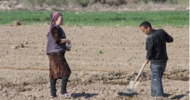India's ACIL Cotton Industries said it plans to invest nearly $15 million to start contract farming of crops like coffee, pulses, oilseeds, cereals, potato, sugarcane and vegetables through lease-hold agricultural land in Brazil, Congo and Ethiopia.
- Business Standard
-
06 January 2011
With vast tracts of land being sold in Madagascar, and Sudan and other African governments actively seeking investors in agricultural land, are we witnessing a neo-colonial land grab or will the investment result in greater food productivity to the long-term benefit of recipient nations?
- African Business
-
07 February 2009
US government reviews efforts to implement voluntary guidelines and go further in legitimising or building consensus around largescale farmland deals
Governments and companies involved in leasing land claim it is little used and that the projects will bring food security, create jobs and boost tax revenues – none of which is true
Karuturi Global plans to plant 20,000 hectares of land with Sorghum, rice, maize, sunflower and soybeans in Bako area of Oromia regional state and Gambella regional state, by November 2011
- Capital Ethiopia
-
06 September 2011
Major farmland investors such as banks and pension funds must stop facilitating land grabs, civil society groups on the eve of a global farmland investment conference in London on December 3-5, have said.
- AkanimoReports
-
30 November 2012
Only legal recognition of commons as the communal property of communities is sufficient to afford real protection, writes Liz Alden Wily
- Wealth of the Commons
-
23 October 2012
Sai Ramakrishna Karuturi talks to the Times of India about his African safari.
- Times of India
-
01 January 2012
Oakland Institute speaks about the findings of their latest round of in-depth research into land grabs in Africa.
- Pambazuka
-
09 December 2011
When will governments recognise the immense potential of their own farmers and their sustainable, diverse family farming systems, that are so desperately in need of genuine 'responsible' agricultural investment to assure food and seed sovereignty, asks Joan Baxter
Some of the major factors drawing companies from India to Africa in addition to the fertile land and natural resources are the exemption from taxes/duties, along with ample government assistance.
Sixty years on, controversial agricultural projects are back in fashion in Africa and other parts of the developing world as investors - from foreign governments to wealthy individuals - hunt for land to grow food.
A US businessman backed by former CIA and state department officials says he has secured a vast tract of fertile land in south Sudan from the family of a notorious warlord.
- Financial Times
-
09 January 2009
Germany's Africa policy coordinator on Thursday blamed China's practice of buying up land in the Horn of Africa for contributing to the devastating famine ravaging the region.
To lure investment dollars, the Sudan government has removed import duties on agricultural equipment being imported into the country.
- Farming UK
-
16 January 2009
When it comes to famine in Africa, China seems an easy target for critics of its rising outbound investments.
- Wall Street Journal
-
25 August 2011
World of Matter project provides video and photos about large-scale agricultural projects, including the Pinesso Group's operations in Sudan and Karuturi's farms in Ethiopia
- World of Matter
-
11 February 2015
In recent years, Gulf economies have tackled their food dependencies not just by importing foodstuffs but through land enclosures, or the purchasing of agricultural land abroad, particularly in the Middle East, North and East Africa (but also as far as the United States and Australia)
Some CSOs are using the media to paint an inaccurate and distorted picture of the World Bank Group’s work and they are questioning the motives of the conference, says the World Bank's Klaus Deininger.
Preparation to counter the gathering of 1,000 African Land Buyers who paid an entrance fee of 3,000 dollar at Waldorf Astoria in Manhattan, New York for their conference from April 23 to April 25 is underway.
The $1bn project, dubbed 7X7, aims at developing 700,000 ha of farmland to produce within 7 years 7 million tonnes of rice in Mali, Senegal and maybe Sudan and Uganda.
If the host state and foreign investors act in conformity with these suggestions, they will maximise the prospects that any large-scale land transaction benefits all stakeholders and minimise the chances of concluding harmful deals.
Zambia has allocated 20,000 hectares of land to large-scale farmers in Kenya to start growing maize which will be exported in the country.
"In a world where war is provoked by food scarcity, farmers are the peacekeepers. No surprise, then, so many regimes want more of them," writes a journalist visiting the South African farmers taking up farming in Georgia.
- Mail & Guardian
-
24 June 2011
The Congo ventures are not core businesses to be based in the Congo but instead, extensions of businesses located in South Africa
- Mail & Guardian
-
12 Mar 2010
The much-discussed Congo land-lease, granting 200,000 hectares to South African farmers with a further 10 million hectares in the balance, appears to mark a departure from the usual terms underpinning foreign acquisition of fertile land by multinationals
- Pambazuka
-
07 January 2010
An internal document recently posted on IRRI's website reveals that the Institute has been advising Saudi Arabia in the context of its strategy to acquire farm land overseas for its own food production.
A flurry of announced international purchases of grain-producing acreage sparks debate about their merits
- World-Grain.com
-
01 June 2009
Our government is planning to offer Arab investors legislative cover to protect them from changes in the government, but hardly any attention has yet been given to the need for protecting poor labourers who will be working for Arab corporate agriculture companies
It has now emerged that the land in question is part of the fertile Tana River delta in Coast Province, the same stretch where plans by Mumias Sugar Company to build a sugar factory have raised objections from pastoralists claiming that their animals will lack pasture and the environment will be destroyed.
- Daily Nation
-
19 December 2008















